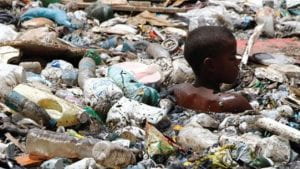 When it comes to ecofeminism many people tend to focus on the theory of it all. Highlighting the connections between the oppression of women and the environment, or looking at women as people who have a close connection to nature. While we all sit and debate about the best ways to look at ecofeminism, the earth around us is dying. Rivers are being filled with trash. Poor women and children are dying of starvation. Forests are being destroyed all in the name of capitalist gain.
When it comes to ecofeminism many people tend to focus on the theory of it all. Highlighting the connections between the oppression of women and the environment, or looking at women as people who have a close connection to nature. While we all sit and debate about the best ways to look at ecofeminism, the earth around us is dying. Rivers are being filled with trash. Poor women and children are dying of starvation. Forests are being destroyed all in the name of capitalist gain.
Ivone Gebara writes about the damage that is happening while this theory is being  discussed. Gebara focuses on the dangers of capitalism, with its keeping of profit amongst a select few while destroying the world for everyone else. Gebara also brings about the idea of a Utopia and how it holds an ideal to work towards and the possibility of hope.
discussed. Gebara focuses on the dangers of capitalism, with its keeping of profit amongst a select few while destroying the world for everyone else. Gebara also brings about the idea of a Utopia and how it holds an ideal to work towards and the possibility of hope.
Jeffrey Bile discusses the fallacies located in ecofeminist theory as well. He brings up the important point of the reality gap between theory and Gebara’s utopia. According to Bile “rhetoric can de-materialize the real in public consciousness and replace it with purely semantic materialized abstraction” (Bile 4). So what Bile is saying here is that ecofeminists come up with this abstract goal to work towards, but then instead of putting in the activism to achieve said goal they instead focus on the theory and continuing that conversation. This harkens back to Gebara’s earlier point of where ecofeminists get swallowed up debating and focusing on who has the right ideas and all the while horrible things are happening across the world and no one is doing anything to fix it.
“The challenge for me is…the destruction of life while we are discussing theories” (Gebara). This is the fundamental need for activism. There are groups all across the globe focused on changing the world. Wangari Maathai is an activist in Africa who is dedicated to creating change. Her Green Belt Movement is responsible for the planting of fifty million trees since 1977. She notoriously stands up against the powers that be so that she can be a voice for her community. The Chipko movement is another such movement that is creating real environmental change.
 These organizations show that change is possible. Why are so many focused instead on theory? According to Bile “practice is always guided by theory” (Bile 5), therefore, theory must be in place before activism can occur. The problem with ecofeminism is that there is no homogenous viewpoint. This leads to the problem that Gebara identifies as each group claiming “its fidelity to the more coherent option for women”, where the three different strains of ecofeminism attempt to prove to the other strains that theirs is the right way. That is the problem with ecofeminism and its theory. There are too many different possibilities leading to a need for theory and rhetoric to back up each strains views. And while this push for theory exists, poor people across the globe will continue to die.
These organizations show that change is possible. Why are so many focused instead on theory? According to Bile “practice is always guided by theory” (Bile 5), therefore, theory must be in place before activism can occur. The problem with ecofeminism is that there is no homogenous viewpoint. This leads to the problem that Gebara identifies as each group claiming “its fidelity to the more coherent option for women”, where the three different strains of ecofeminism attempt to prove to the other strains that theirs is the right way. That is the problem with ecofeminism and its theory. There are too many different possibilities leading to a need for theory and rhetoric to back up each strains views. And while this push for theory exists, poor people across the globe will continue to die.
Works Cited
Bile, Jeffrey. “The Rhetorics of Critical Ecofeminism: Conceptual Connection and Reasoned Response.” Ecofeminism and Rhetoric: Critical Perspectives on Sex, Technology, and Discourse, edited by Douglas A. Vakoch, 1st ed., Berghahn Books, New York; Oxford, 2011, pp. 1–38. JSTOR, www.jstor.org/stable/j.ctt9qcnk8.5.
This source helped me to stress my point and allowed me to research deeper and expand on the original idea I had in writing this post.
Corrêa, Talita. “The Brazilian Slum Children Who Are Literally Swimming in Garbage.” Vice, 30 Jan. 2014, www.vice.com/en_us/article/kwpwja/the-brazilian-slum-children-who-are-literally-swimming-in-garbage-0000197-v21n1.
Gebara, Ivone. “Ecofeminism: a Latin American perspective.” Cross Currents, vol. 53, no. 1, Spring 2003, p. 93+. Gale Academic OneFile, https://link.gale.com/apps/doc/A102979447/AONE?u=mlin_s_umass&sid=AONE&xid=8c5bdf88.
Maathai, Wangari. “Speak Truth to Power.” The Green Belt Movement, 4 May 2000, www.greenbeltmovement.org/wangari-maathai/key-speeches-and-articles/speak-truth-to-power.
The Chipko Movement, edugreen.teri.res.in/explore/forestry/chipko.htm.

Hi Kiera,
This is a very interesting point you made regarding the way we get caught up in “theory” and I also liked the article authored by Gebara but as I read it last week, some of it was hard for me to grasp. I think that there are times social groups in any category seems to lose focus on what the real issues are, and whether feminist, theologists, ecologists, or any group who is advocating, the shift then becomes “who” that group is, rather than their mission. I do not see the connection with utopia and feminism as it relates to a universal “ecofeminism” as this makes me think there is no diversity for ecofeminist theory. This is because utopia would only referenced ecological concerns, which is good in one sense, but not taking into account the oppressions of women in different groups. I do agree that we should find a common utopia but then again, where is the “interconnected web” in that concept. Great perspective though!
Hi,
You made a great point talking about Ivone Gebara stating that the world is crumbling while we spend time discussing it. She felt very strongly that the patriarchy was ingrained into our society and also our environmentalism. She said, “Daily life for most poor women is like a jail” and that “it is more or less the same everywhere in the world.” Even though Gebara is writing from a perspective of mainly what it is like in Latin America, the readings that we had this week definitely showed that there are similar situations all around the world. Living in an area with clean water and clean air is a privilege. It is so easy to forget that that’s a privilege until we read about women and children living in other countries struggling to get through a day as they battle problems the earth has shown them. We read many testaments this week about ways people all struggling against their own environment, and it is frustrating because often the people who have the power to change it don’t even realize that it is a problem.
Hi Kiera,
Your point on the various versions and theories of ecofeminism not leading to a homogenous viewpoint is extremely valid. I myself have questioned why so much emphasis was put on theory, Of course studying and observations are significant because it shows us the realities of our world and gives us knowledge to educate and change current systems in place. With that being said in the examples you gave from the readings this week The Green Belt Movement and the Chipko Movement were forms of activism that literally influenced and impacted environmental change. As you stated with theory there are often suggestions or plans discussed yet where is the follow through is not always there. Also touching on the topic of capitalism and the fact that it does destroy most of the world. There is a good article I found from 2018 and it discusses the relationship between capitalism and the environment. The article starts off with this quote which says “”Capitalism is incompatible with the conservation of nature. Only the places with a strong state and restricted economic freedom can achieve high environmental quality ratings.” (https://mises.org/wire/real-relationship-between-capitalism-and-environment) The article has many visuals to highlight the issues surrounding capitalism. It is interesting though because many people in the United States seem to believe that as far as our country goes they seem to believe capitalism is the most beneficial form of life.